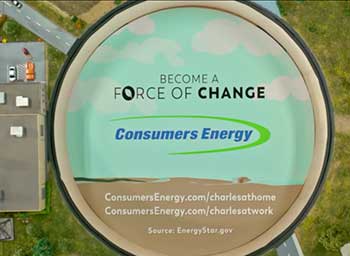For Michigan residents, you generally don’t have much choice when it comes to your electric and natural gas utility provider. Most addresses are served by either DTE Energy or Consumers Energy, the two major utility companies operating in the state.
But how do you know if you’re getting the better deal or more reliable service?
In this comprehensive guide, we’ll compare DTE and Consumers head-to-head, looking at pricing, customer satisfaction, service reliability and more.
By the end, Michigan residents should have a clearer picture of the pros and cons of both utility providers.
A Brief Comparison Table
| Category | DTE Energy | Consumers Energy |
| Average Electricity Rate (2022) | 16.0¢ per kWh | 15.7¢ per kWh |
| Outage Frequency | Higher | Lower |
| Outage Duration | 2-2.5 hours | 2-2.5 hours |
| Storm Response | Slower | Faster |
| Infrastructure Age | Older equipment | Modernizing |
| Time-of-Use Rates | Pilot programs | Widely available |
| Fixed Rate Plans | No | Yes, up to 36 months |
| Discounts | More options like 15% low-income | Fewer discount programs |
| Customer Satisfaction | Lower marks | Higher marks |
| Social Media Engagement | Very active | Less active |
| Billing Issues | Frequent complaints | Also frequent complaints |
DTE Energy Or Consumers Energy: Key Features Compared
Pricing and Rate Options

When it comes to pricing and rate options, DTE and Consumers offer similar choices for residential customers. Both have tiered pricing structures based on usage, with higher per kWh rates as you use more electricity.
They also offer budget billing plans to even out payments year-round, as well as renewable energy options.
However, there are some key differences:
Time-of-Use Pricing: Consumers offers time-of-use rates that charge less for off-peak usage. DTE has pilot programs for this but no widespread time-of-use rates currently.
Fixed Vs. Variable Rates: Consumers gives you the choice of fixed or variable rate plans up to 36 months long. DTE only offers variable rates.
Discounts: DTE offers more discounts, like a 1-2% discount for paying with bank drafts and a larger 15% discount for low-income households.
Average Rates: In 2022, the average price per kWh for DTE customers was 16.0¢ Vs. 15.7¢ for Consumers’ customers. However, rates vary based on your location and usage.
So when it comes to pricing and rate options, Consumers may have a slight edge for large parts of Michigan. But check your specific area’s rates when comparing.
Also Read: Choose Between TXU Energy And Ambit Energy.
Reliability and Outages
Reliability is tricky to compare as it depends on your location and sources cite different metrics. But we’ll try to break down the data:
Frequency of Outages: Consumers customers experienced ~10% fewer outages than DTE’s in recent years, according to data from the public utility commissions.
Length of Outages: Numbers are similar, with average restoration times of 2-2.5 hours for both after an outage occurs.
Storm Response: After major storms like the August 2022 derecho, both utilities came under fire for lengthy outages. DTE faced bigger criticism for very slow response times.
Infrastructure Age: Consumers has invested in modernizing infrastructure while DTE operates some of the oldest equipment in the U.S. This suggests Consumers may suffer fewer outages going forward.
So for reliability, Consumers seems to edge out DTE slightly based on recent metrics. But there are regional differences, and infrastructure age is a big wildcard. Check outage histories in your area for a better sense of personal reliability.
Customer Satisfaction
There are mixed signals when it comes to customer satisfaction:
- JD Power Survey: In a 2022 residential customer satisfaction survey by JD Power, Consumers scored 10 points higher than DTE overall.
- Complaint Rates: Consumers generates significantly fewer customer complaints per capita than DTE, according to Michigan’s utility commission.
- Social Media: Sentiment on social media indicates higher dissatisfaction with DTE’s customer service after storm outages. But they are very engaged on social media for a utility.
- Billing: Customers commonly complain about high bills and billing errors from both companies. But it’s unclear who has fewer issues.
While the statistics favor Consumers, social media indicates DTE makes more effort to engage customers. But engagement doesn’t always translate to satisfaction. Overall Consumers customers seem more satisfied by ratings, but your personal experience may vary.
Also Read: Comparison Between National Grid And Eversource.
Pros And Cons Of DTE Energy
Pros
- Offers income-qualified discounts up to 15% off
- Provides 1-2% discount for paying with bank drafts
- Has begun piloting time-of-use pricing options
- Actively engages with customers on social media
Cons
- Customers pay slightly higher average electricity rates
- Suffers more frequent and longer power outages
- Slow storm response and restoration times
- Old infrastructure leads to reliability concerns
- Below-average customer satisfaction scores
Also watch this!
Pros And Cons Of Consumers Energy
Pros

- Slightly lower average electricity rates
- Better reliability metrics like fewer outages
- Offers time-of-use and fixed rate plans
- Higher customer satisfaction marks
- Modernizing infrastructure to improve reliability
Cons
- Can have regional reliability issues
- Fewer discount programs like income-qualified rates
- Less social media engagement with customers
- Still frequent billing errors and complaints
Frequently Asked Questions (FAQ)
DTE and Consumers have service territories divided up across Michigan. In general, DTE serves southeast Michigan including Detroit, while Consumers serves middle and southwest Michigan including Lansing and Grand Rapids. Your location determines which provider you get.
Unfortunately, no. Because DTE and Consumers have defined service areas, Michigan residents cannot choose or switch between them. You’re stuck with whichever provider serves your address.
DTE’s reliability is below average compared to other utilities. They have more frequent and longer power outages than Consumers in recent years. Slow storm restoration also drags down reliability. But it depends on your region, as some areas fare better than others.
If your DTE bill seems unusually high, a few factors could be contributing. High natural gas costs in 2023 are driving up utility bills everywhere. You may also be using more energy with people at home. Finally, rate hikes of 9% were just approved for DTE to improve infrastructure. All this combines for higher 2023 bills. Try using less energy or asking about bill payment assistance.
Also Read: Comparison Between Semper Solaris And Sunrun:.
Conclusion
For most Michigan residents, you’re stuck with either DTE or Consumers based on your address. This makes choosing between the two tough.
In terms of pricing, customer satisfaction and reliability, Consumers Energy tends to rate better across the state on average. Their modern investments also bode well for future reliability.
However, if you live in an outage-prone area for Consumers or have received excellent service from DTE, your perspective could differ. Bill payment options, social media engagement and individual experiences also factor in.
Do your own research on rates and outage histories specific to your region. While overall Consumers may have a slight edge, focus on your personal metrics and needs in deciding.
Neither utility is perfect, but being an informed customer helps ensure you get the best electric and gas service possible.
